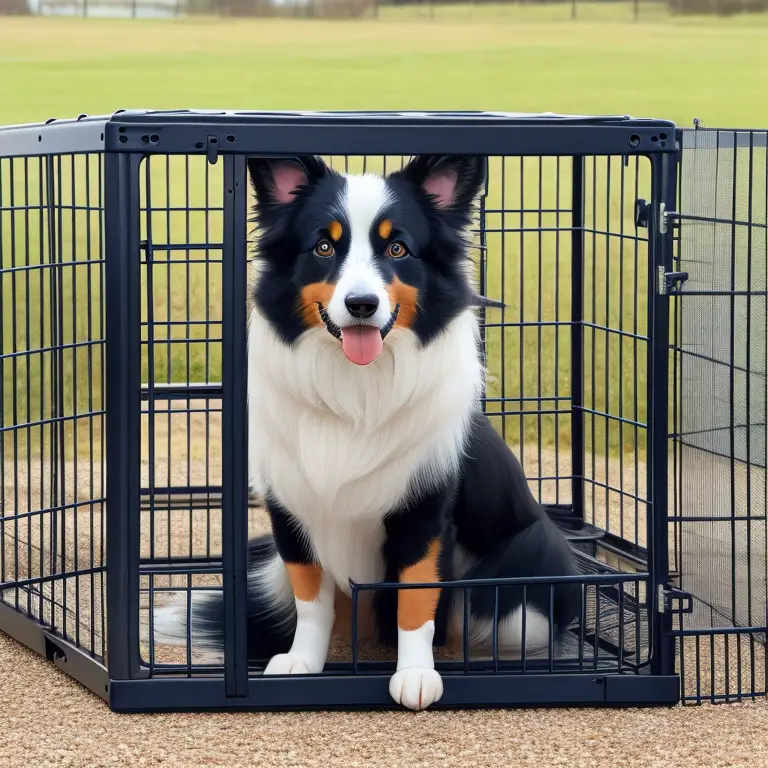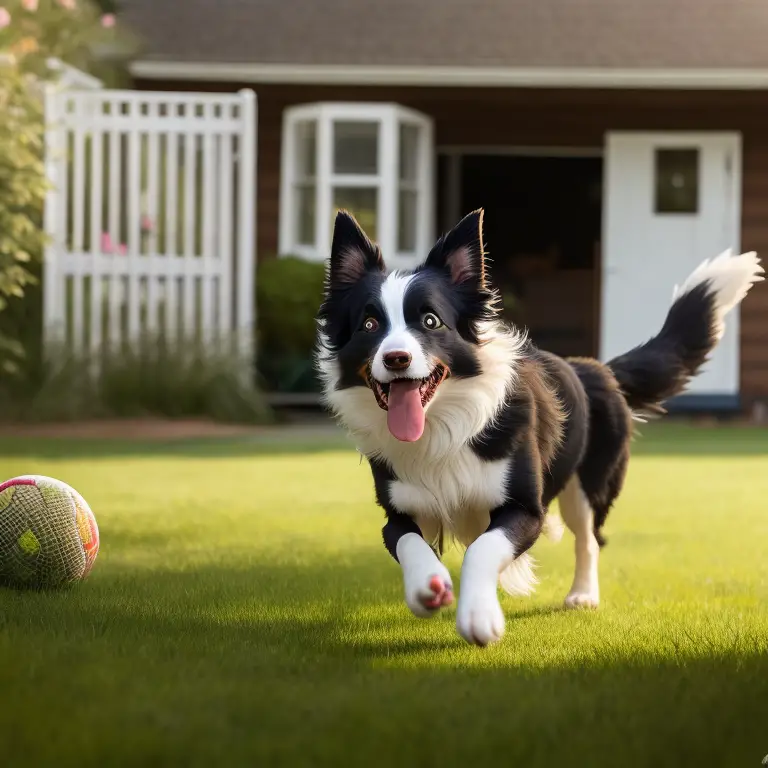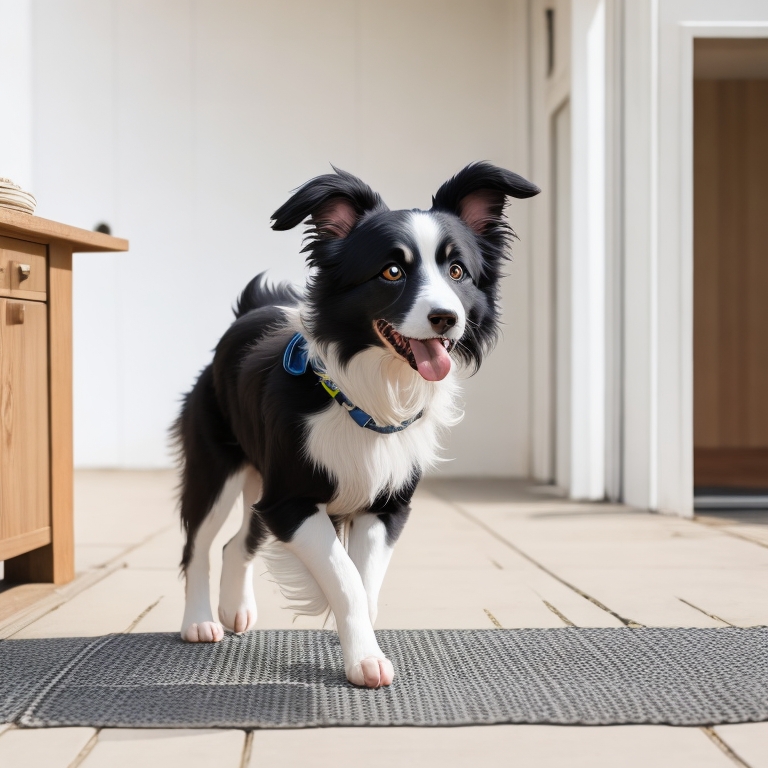How To Prevent Border Collies From Escaping Or Bolting?
Do you have a Border Collie that likes to go on unexpected escapades? These intelligent and spirited dogs are known to be escape artists and can easily bolt before you know it.
However, you can prevent this behavior by understanding their nature and taking appropriate measures.
In this article, we will discuss the reasons why Border Collies may escape or bolt, and how you can prevent it. From securing fencing and living quarters to providing them with adequate exercise and training, we’ve got you covered.
Stay tuned for some tips on how to deal with an escaped Border Collie and prevent it from happening again.
| Preventive Measures | Description |
|---|---|
| Training | Border Collies require plenty of exercise and mental stimulation. Training them to stay within boundaries can prevent them from escaping or bolting when bored or restless. |
| Fenced yard | A tall and sturdy fence can keep Border Collies from escaping from the yard. Make sure the fence is at least 6 feet high with no gaps or holes. |
| Supervision | If your Border Collie is prone to escaping or bolting, it’s important to supervise them when they are outside and avoid leaving them unattended for long periods of time. |
| Crate training | Teaching your Border Collie to enjoy spending time in their crate can prevent them from getting bored and attempting to escape or bolt. Make sure the crate is large enough for them to stand up and turn around comfortably. |
| Interactive toys | Providing your Border Collie with interactive toys, such as puzzle toys or chew toys, can keep them mentally stimulated and reduce the likelihood of them escaping or bolting due to boredom. |
Understanding Your Border Collie
The Nature of Border Collies
Border Collies are highly energetic and intelligent dogs. They were originally bred for herding livestock and are now known for their athleticism and agility.
Border Collies have a strong work drive and need plenty of physical and mental stimulation.
They are also very loyal and affectionate towards their owners. Due to their natural instincts, Border Collies may have a tendency to escape or bolt if they feel bored or restless.
They are excellent jumpers and can easily clear fences if they are not properly secured.
It’s important to provide them with enough exercise and mental stimulation to prevent boredom and restlessness. Border Collies require a lot of attention, patience, and training to reach their full potential.
They thrive on active families who can give them plenty of exercise and opportunities to explore their surroundings.
It’s important to understand the nature of Border Collies to provide them with adequate care and prevent them from escaping or bolting.

Why Border Collies May Escape or Bolt
Border Collies are known to be highly intelligent and active dogs that require a lot of exercise and mental stimulation. If they are not given enough opportunities to release their energy, they may become restless and start looking for ways out.
Moreover, Border Collies have a strong herding instinct that drives them to chase after moving objects like cars, bicycles, or other animals.
If they see something that catches their attention, they may dash off without warning, often without heeding their owner’s commands. Another reason why Border Collies may escape or bolt is due to anxiety, fear, boredom, or neglect.
If they are left alone for long periods without human or canine companionship, they may resort to destructive behavior or try to escape to find more stimulating environments.
Finally, some Border Collies may bolt or escape out of curiosity or wanderlust. They may want to explore their surroundings or seek adventure, and when they get the chance, they may run away and not come back.
Therefore, to prevent Border Collies from escaping or bolting, it is essential to understand their nature, needs, and motivations, and provide them with proper care, exercise, training, socialization, and attention.
Preventing Escape or Bolting
Secure Fencing
Secure fencing is one of the most critical steps to prevent your Border Collie from escaping or bolting. An ideal fence should be at least six feet tall to prevent your pet from jumping over it.
The fence must not have any gaps or holes that your dog can squeeze through or dig under.
Consider using sturdy and durable materials, such as vinyl, chain-link, or wooden fencing. It’s also a good idea to place a barrier, such as a hedge, along the base of your fence to stop your dog from digging under it.
Make sure that the gate is secured and locked appropriately to prevent your Border Collie from pushing it open.
If you have a chain-link fence and your pet tends to climb it, you can install a slanted extension at the top of the fence to deter climbing. Overall, a secure fence can help keep your Border Collie safe and prevent them from escaping or bolting.
Ensure that you regularly inspect and maintain your fence to ensure its effectiveness.

Escape-Proof Living Quarters
When it comes to ensuring your Border Collie’s safety, escape-proof living quarters are crucial. Here are some tips to prevent your furry friend from escaping or bolting:
- Choose a sturdy and secure crate: Using a crate can be useful as a designated safe space for your Border Collie. However, ensure that the crate is strong and made of durable materials.
- Use a secure lock system: Keeping the lock system secure can prevent your Border Collie from pushing their way out of the crate.
- Reinforce the crate: Reinforcing the crate can be done by adding extra bolts or a metal mesh around the crate.
- Check for small openings: Border Collies are skilled escape artists, and they may find escape routes through small holes or gaps. Therefore, it’s essential to ensure no openings exist that could be used as escape routes.
- Use deterrents: You can use deterrents like white noise machines or window film to prevent border collies from seeing other animals outside, which could trigger their escape instincts.
By using these methods, you can create an escape-proof living space for your Border Collie and avoid any potential risks.

Adequate Exercise and Playtime
Your Border Collie needs plenty of exercise and playtime to keep them healthy and emotionally balanced. To prevent them from escaping or bolting, you must provide adequate exercise and playtime every day.
Border Collies are high-energy dogs that require at least 2 hours of exercise every day.
Exercise keeps them mentally stimulated and physically active, lowering the probability of escaping for entertainment and stimulation. Playtime should be interactive and engaging.
You can play fetch, frisbee, or other games that involve running and catching.
Border Collies also love to play hide and seek or puzzle games to challenge their intellect. Incorporating obedience training and agility activities in their play sessions is an effective method to give them a mental and physical workout.
Adequate exercise and playtime can also reduce stress and anxiety in Border Collies, which can prevent them from escaping or bolting due to fear or anxiety.
By exercising them insightfully, you will reduce the chances of frustration and boredom, and your Border Collie will be more prone to stay within the boundaries. Remember that the actual quantity of exercise and playtime required will depend on your Border Collie’s age, health, and overall temperament, but consistent and regular physical exertion is vital.
In summary, to prevent your Border Collie from escaping or bolting, provide adequate exercise and playtime every day.
Making exercise and playtime your priority can keep your Border Collie happy and satisfied, reduce the chances of escape or bolting, and strengthen your relationship with your furry friend.
Training and Socialization
Training and socialization are crucial to preventing Border Collies from escaping or bolting. Proper training should begin early to establish basic obedience and commands such as “come,” “stay,” and “heel.” Consistency is key, and training should be reinforced regularly throughout the dog’s life.
Socialization is also essential, particularly with other dogs and people.
It not only helps to prevent escapes but also ensures that your Border Collie is a well-adjusted, happy dog. Exposing your dog to a variety of people, situations, and environments can help them to remain calm and reduce their urge to bolt or escape.
Positive reinforcement training techniques are highly effective and recommended for Border Collies.
Avoid punishment-based training which can lead to fear and anxiety in your dog, increasing the likelihood of escape or bolting. Enrolling in obedience classes with a professional trainer is an excellent way to ensure that your Border Collie receives proper socialization and training.
These classes provide a structured environment for your dog to learn in and also offer the opportunity to interact with other dogs and people.
Regular exercise and playtime also aid in preventing escapes or bolting. A bored or under-exercised Border Collie is more likely to seek stimulation and adventure outside their living quarters.
Consistent walks, runs, and playtime with your dog can combat this issue.
Training and socialization are essential components to preventing Border Collies from escaping or bolting. By providing proper training and socialization, you can set your dog up for a happy and fulfilling life.

Identification and Microchips
If your Border Collie does escape or bolt, it’s essential to have them identified and microchipped. A microchip is a small device that is inserted under the skin, usually between the shoulder blades.
The tiny chip contains a unique identification number that can be scanned by a microchip reader.
Make sure your Border Collie is wearing a collar with identification tags that include your name and phone number. However, collars and tags can fall off or be removed, which is why a microchip is a more reliable form of identification.
Microchipping is a quick and easy procedure that can be done by a veterinarian or animal shelter.
The cost of microchipping is relatively affordable, and it could save you a lot of heartache and money in the long run. If your Border Collie does escape or is lost, you can contact your veterinarian or microchip provider to report them missing.
If someone finds your dog, they can take them to a shelter or veterinary clinic, where the microchip can be scanned to identify you as the owner.
In summary, microchipping your Border Collie is one of the best ways to ensure they are quickly reunited with you if they escape or get lost. It’s an easy and affordable procedure that provides peace of mind and may even save your dog’s life.

Professional Assistance
When it comes to preventing Border Collies from escaping or bolting, sometimes you may need the help of a professional. A dog trainer or behaviorist can assess your dog’s specific needs and suggest training techniques to discourage and prevent future escape attempts.
Moreover, a professional can offer valuable insights into your dog’s behavior, socialization, and exercise needs.
They can also help you choose a suitable fencing system, suggest escape-proof living quarters, and identify effective identification methods. Thus, if your Border Collie has already shown a proclivity for escaping, seeking professional assistance can be a proactive measure to prevent future incidents.
Dealing with an Escaped Border Collie
Immediate Response
If your Border Collie has escaped, the first thing you should do is remain calm and act quickly. Your immediate response can help increase the chances of finding your dog safely.
Staying calm is important as it allows you to think clearly and take necessary measures to locate your dog.
Scolding or yelling at your dog may cause them to run further away from you. Immediately start searching for your dog in your local area and surrounding areas.
Contacting local animal shelters, vet clinics, and dog pounds can help you find your dog.
Posting flyers and contacting local animal rescue organizations can also be helpful. When you eventually find your Border Collie, approach them slowly and calmly.
Avoid making sudden movements or loud noises that may scare them.
Offer treats or call them with a friendly, upbeat voice. It’s important to take steps to prevent future escapes.
Ensure that you provide enough exercise, mental stimulation, training, and secure fencing to keep your Border Collie safe.
Taking these measures can help prevent future escapes and keep your dog safe and secure.
Searching For Your Border Collie
If your Border Collie has escaped or bolted, it is crucial to start searching immediately. Here are some tips for finding your furry friend:
- Start by searching your immediate surrounding area. Look under bushes, in alleyways, and anywhere else your dog might be hiding.
- Ask your neighbors if they have seen your dog. Be sure to leave your contact information with them and ask them to call you if they see anything.
- Contact your local animal shelter and report your dog missing. Provide them with any identification or microchip information you have.
- Spread the word on social media. Post pictures of your dog and ask for help from friends and family in the area.
- Check online lost and found dog databases. There are many websites and social media pages dedicated to reuniting lost pets with their owners.
Remember, it’s important to act quickly when searching for your Border Collie. The sooner you start searching, the better your chances are of finding them.
Tips for Retrieving an Escaped Border Collie
Dealing with an escaped Border Collie can be a stressful and worrying experience. Here are some tips to help you retrieve your furry friend safely:
- Stay Calm: As difficult as it may be, it is essential to stay calm. Your Border Collie can sense your anxiety and may become more difficult to catch.
- Search the Local Area: Start with the immediate area around your home. Call out your dog’s name, and listen for any barking or rustling in nearby bushes or fields.
- Seek Assistance: Ask your neighbors, friends, and family to help you search. They may have spotted your dog while on their daily walk.
- Use Social Media: Social media has a massive outreach, and it can be used to alert the local community to watch out for your dog. Post a picture and provide information on where the dog was last seen.
- Use Food and Toys: Use treats, toys, and familiar blankets to attract your Border Collie back to you. Be patient and persistent.
- Stay on High Alert: Keep your phone on and listen out for any barking or whining sounds. Continue your search, even if it takes several days.
By following these tips, you can increase your chances of retrieving your Border Collie and preventing future escapes.
Preventing Future Escapes or Bolts
To prevent future escapes or bolts, consider implementing the following:
- Secure Fencing: Install a fence with no gaps or weaknesses that your border collie can exploit. Make sure it is also tall enough to prevent jumping.
- Escape-Proof Living Quarters: Limit your border collie’s access to open doors or windows leading to the outdoors and provide a safe, comfortable indoor area for them to reside in.
- Adequate Exercise and Playtime: Ensure your border collie gets enough exercise and playtime as their wandering tendencies often stem from boredom or pent-up energy.
- Training and Socialization: Teach your border collie basic obedience commands and socialize them with other dogs and people to minimize the risk of running away due to stress or fear.
- Identification and Microchips: Make sure your border collie has updated identification tags and consider getting them microchipped for added security.
- Professional Assistance: If your border collie continues to escape despite these preventative measures, seek professional help from a veterinarian, dog trainer, or animal behaviorist.
Implementing these steps can go a long way in preventing future escapes or bolts and keeping your border collie safe and secure.

Conclusion
Preventing your Border Collie from escaping or bolting requires a combination of measures that address their natural instincts, provide adequate exercise and playtime, and implement secure living quarters and identification. Training and socialization play a critical role in teaching your Border Collie appropriate behaviors.
Always respond promptly and efficiently if your Border Collie escapes or bolts, and take steps to prevent future occurrences.
Ultimately, understanding your Border Collie’s needs and behaviors is essential to preventing escape or bolting. By implementing the preventative measures discussed in this article, you can help ensure that your Border Collie remains safe and content in their home environment.
Remember, investing time and resources in properly caring for your Border Collie is a small price to pay in exchange for the unconditional love and companionship they bring to our lives.







